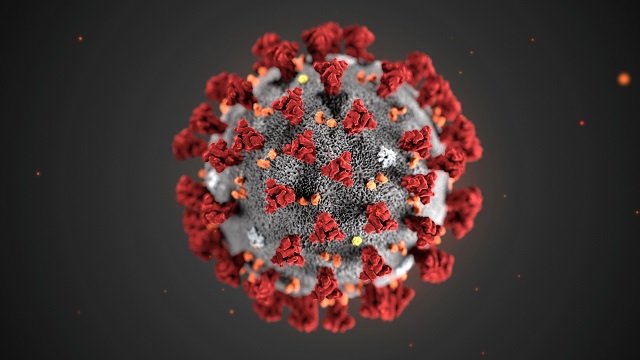
Coronavirus makes cells grow tentacles, reveals new study
People living with HIV infections may not face higher-than-average risks of bad outcomes from Covid-19
The following is a brief roundup of some of the latest scientific studies on the novel coronavirus and efforts to find treatments and vaccines for Covid-19, the illness caused by the virus.
“Tentacles” on hijacked cells might help coronavirus spread
When a virus infects a cell, it hijacks enzymes called kinases that control the cell's functions. A new study identified 49 kinases hijacked by the new coronavirus, including one called CK2 that generates hair-like tentacles, called filopodia, that protrude from the cell with virus particles inside them.
Researchers who led the study published in Cell on Sunday believe this may help the coronavirus to infect other cells.
Kinases "are one of the most druggable groups of proteins in our cells," coauthor Nevan Krogan from the University of California, San Francisco told Reuters.
The team identified five potentially promising drugs already being used or tested against malfunctioning kinases in other diseases, one of which - silmitasertib - targets CK2.
Facebook is introducing a dark mode for mobile
"We think that this drug works by stopping the formation of the filopodia, and we are testing this now in the lab," said Krogan.
Coauthor Marco Vignuzzi of Institute Pasteur in Paris told Reuters that because CK2 seems to be involved in the tentacles, using a kinase inhibitor that targets CK2 might reduce or inhibit their formation. "If the virus uses this to transmit from cell to cell, then virus spread will be reduced," he said.
Covid-19 outcomes do not appear worse in people with HIV
People living with HIV infections may not face higher-than-average risks of bad outcomes from Covid-19, a study from New York City suggests. Doctors at one large health system compared 88 hospitalised Covid-19 patients with well-controlled HIV to 405 patients without HIV, all with similar Covid-19 severity on admission. Poor outcomes for hospitalised Covid-19 patients with HIV were "frequent but similar" to outcomes in patients without HIV, researchers reported on Sunday in Clinical Infectious Diseases.
Among those with HIV, 18% required mechanical ventilation, and 21% died, compared with 23% and 20%, respectively, for those without the virus that causes AIDS. These findings need to be verified in other large populations, the researchers say.
Social distancing by healthy young adults may reduce the severity of infections
A study of young soldiers suggests the benefits of social distancing during the pandemic might extend beyond high-risk individuals. When the Swiss army put social-distancing, mask-wearing, and hygiene rules into effect on a base where no one had been diagnosed with Covid-19, not only was the later spread of the virus limited, but soldiers who did get infected did not develop symptoms of Covid-19.
At the base, 354 soldiers were sharing the same barracks, while 154 soldiers were housed roughly 3 kilometers away.
On March 11, the first Covid-19 diagnosis was made in the shared barracks. Nine days later, "both units were put under quarantine, and hygiene measures were rigidly enforced" across all companies, according to a report on Sunday in Clinical Infectious Diseases.
By day 54, 29% of the soldiers in the shared barracks had positive coronavirus tests and Covid-19 symptoms. In the other barracks, none of the soldiers developed symptoms, even though 13 (8%) were found to have virus in their nasal passages and antibodies to the virus in their blood.
The results suggest that among healthy young adults, social distancing measures with enhanced hygiene and masks might not only slow coronavirus infection but also reduce the rate of symptomatic patients among those infected, the researchers say.
India bans 59 mostly Chinese apps including TikTok, UC Browser, WeChat
T cells play key role in fighting the virus in sickest Covid-19 patients
A Dutch study of 10 patients with severe Covid-19 found that upon admission to the intensive care unit, most of them already had T cells that recognised and targeted the coronavirus. The findings may add to information about the role of T cells - a key component of the immune system in fighting the illness and help inform the development of vaccines that induce the body to produce these cells.
The study, led by Alessandro Sette at La Jolla Institute for Immunology in California and Rory de Vries at Erasmus MC in Rotterdam, found that patients' T-cell levels generally rose over time along with levels of antibodies that could neutralize the virus, while viral loads decreased.
Furthermore, two uninfected volunteers also had T cells that recognised the virus and responded to it in test tubes, adding to evidence that T cells produced by the body in response to previous infections with common cold coronaviruses may also react to this new virus.
The findings are in line with a recent study in American patients with moderate Covid-19. In both studies, the immune cells targeted the "spike" protein the virus uses to enter cells, but in the new study the T cells also mounted strong responses to other targets on the virus, the researchers reported in Science Immunology on Friday.
The new study offers further evidence that the spike protein is a promising target and suggests new avenues to potentially increase vaccine potency, according to a news release from La Jolla Institute for Immunology.



1731652244-0/apple-(6)1731652244-0-270x192.webp)











COMMENTS
Comments are moderated and generally will be posted if they are on-topic and not abusive.
For more information, please see our Comments FAQ